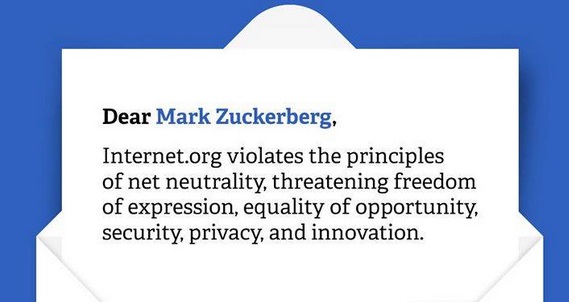Facebook is under increasing pressure to withdraw its Internet.org project, following claims that the free mobile web service is a threat to net neutrality.
A group of more than 67 associations for civic and digital liberties, signed an “Open Letter to Mark Zuckerberg Regarding Internet.org, Net Neutrality, Privacy, and Security“.
The letter claims that Facebook’s Internet.org initiative threatens freedom of expression, equality of opportunity, security, privacy and innovation
“It is our belief that Facebook is improperly defining net neutrality in public statements and building a walled garden in which the world’s poorest people will only be able to access a limited set of insecure websites and services,”the letter states.
“Further, we are deeply concerned that Internet.org has been misleadingly marketed as providing access to the full Internet, when in fact it only provides access to a limited number of Internet-connected services that are approved by Facebook and local ISPs.”
Internet.org is a global partnership launched in 2013 with the aim of making internet access available to the two-thirds of the world that are not yet connected. As well as Facebook, founding members include Ericsson, MediaTek, Nokia, Opera and Qualcom.
Facebook has yet to respond, but Zuckerberg has previously defended his effort to get people online, by saying: “It’s not an equal internet if the majority of people cannot participate.”
Facebook says more than nine million people have used the scheme to date.
Internet.org lets subscribers of partner mobile networks to use a limited number of online services without having to pay to make use of the data involved.
They include Wikipedia, the Facts for Life health site run by the United Nations Children’s Fund, BBC News, Facebook, Accuweather and a selection of local news and sports results providers.
To access the facility, people must use special Android apps, Internet.org’s website, Facebook’s own Android app or the Opera Mini browser.
The web pages provided must be basic to minimise data use – high resolution photos, videos and voice chat facilities are not permitted.
Network operators participate because they believe users will pay for wider internet access once they have had a chance to try out the free content on offer.
Since 2014, the project has launched in Zambia, India, Colombia, Guatemala, Tanzania, Kenya, Ghana, the Philippines, Indonesia and Malawi.
Zuckerberg recently sought to address concerns by inviting more organisations to apply to join Internet.org’s platform.
But one of his requirements – that the websites should not include the HTTPS, TLS or SSL encryption technologies – caused fresh controversy.
In their letter, the campaigners suggest this will make users’ web traffic “vulnerable to malicious attacks and government eavesdropping”.
However, a Q&A published on Internet.org’s site promises it will begin to support SSL and TLS “in the Internet.org Android app in the coming weeks”.
Zuckerberg has posted a message to his Facebook page promising that support for HTTPS is also under development.
